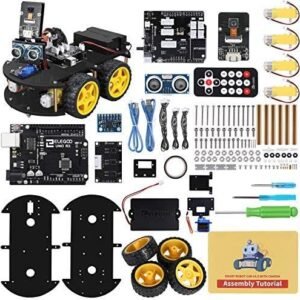In recent years, the music landscape has experienced a technological renaissance, thanks in large part to advancements in artificial intelligence (AI). As artists, producers, and technologists converge, AI is not merely a tool for convenience; it’s redefining the very essence of musical creation and performance. From composing intricate symphonies to generating captivating soundscapes in real-time, the potential of AI in music is vast and multifaceted. In this article, we will embark on a journey through the innovative realms of AI-driven music, exploring how machine learning algorithms are transforming composition practices and enhancing live performances. We’ll examine case studies of pioneering artists and tech startups leveraging AI to push creative boundaries, while also discussing the implications of this technology for the future of music. Join us as we delve into the harmonious intersection of art and science, revealing how AI is not just the future of music, but a vital player in its present.
Table of Contents
- The Intersection of Technology and Creativity in Music Composition
- Enhancing Performance with Real-Time AI Music Assistants
- AI Tools for Musicians: Recommendations for Composers and Performers
- Exploring Ethical Considerations in AI-Generated Music
- Key Takeaways
The Intersection of Technology and Creativity in Music Composition
The fusion of technology and artistry has revolutionized the landscape of music composition, making it an exhilarating canvas for both established artists and emerging talents. One of the most significant innovations is the use of artificial intelligence (AI) to create music that not only mimics human creativity but also introduces entirely new sonic experiences. Tools such as AI-driven composition software analyze vast libraries of existing music, recognizing patterns, styles, and structures, enabling the creation of original compositions that are both intricate and appealing. This synergy allows musicians to explore new genres and styles previously thought impossible, breaking the barriers of traditional writing techniques.
Moreover, the advancements in AI technology enhance live performances by providing real-time improvisation and accompaniment. Musicians can collaborate with AI systems that adjust to their playing or singing, creating a dynamic and interactive experience. Key benefits of these advancements include:
- Enhanced Collaboration: Artists can brainstorm and expand on ideas rapidly.
- Accessibility: Aspiring composers can create music without extensive training.
- Personalized Soundscapes: AI tools can tailor compositions to fit specific moods or themes.
A glimpse into the transformative nature of these innovations can be seen in the table below, showcasing how technology is redefining creativity across various aspects of music composition and performance.
| Innovation | Description |
|---|---|
| AI Composition Tools | Create original pieces based on user input and musical analysis. |
| Digital Instruments | Reproductions of traditional sounds with enhanced capabilities. |
| Performance Software | Enhances live shows with real-time audio manipulation. |
Enhancing Performance with Real-Time AI Music Assistants
As musicians seek to elevate their performance, real-time AI music assistants are emerging as game-changers in the industry. These innovative tools facilitate seamless interactions between the performer and technology, fostering a creative partnership that enhances both the individual artist’s expression and the overall musical experience. With capabilities such as live composition, improvisation support, and adaptive accompaniment, these assistants can analyze a musician’s playing style and preferences, offering personalized suggestions that inspire and refine their performance. This technological synergy fosters an environment where artists can break through creative blocks and explore new territories in sound.
Moreover, the integration of AI into live performances leads to a dynamic and engaging experience for audiences. By utilizing machine learning algorithms, these assistants can respond to real-time feedback, adjusting harmonies and rhythms to complement the ensemble or soloist flawlessly. Some notable features of these AI music assistants include:
- Real-Time Feedback: Instant analysis of performance to suggest improvements.
- Improvisational Tools: Generate new musical ideas on-the-fly.
- Interactivity: Engage the audience through unique performances tailored to their reactions.
AI Tools for Musicians: Recommendations for Composers and Performers
The integration of AI tools into the music creation process has opened unprecedented avenues for composers and performers alike. For those looking to enhance their creative capabilities, consider using AIVA, an AI music composition tool that enables users to generate original scores by simply inputting parameters such as mood, tempo, and genre. Another fantastic resource is Amper Music, which allows musicians to create custom tracks by selecting styles and instrumentation, producing professionally mixed and mastered audio suitable for various projects. These tools not only augment the creative workflow but also inspire new ideas and directions in music composition.
Performers can also benefit from AI-driven resources designed to assist with practice and performance enhancement. Tools like Melody Scanner help musicians by automatically transcribing music they play into sheet music, making it easier to learn and replicate pieces. Additionally, Yousician, an interactive music teaching platform, employs AI to offer real-time feedback on your playing, creating a more engaging and effective practice session. By incorporating these innovative tools, both composers and performers can elevate their craft, ultimately transforming how music is created and enjoyed.
Exploring Ethical Considerations in AI-Generated Music
The rise of AI-generated music invokes a plethora of ethical considerations that are reshaping the landscape of creativity and expression. As algorithms increasingly partake in the music composition process, one crucial aspect to ponder is authorship. Who holds the rights to a piece of music created by an AI? Is it the programmer, the user, or the AI itself? Furthermore, the transparency of AI processes raises questions about accountability in cases of plagiarism or copyright infringement. As AI continues to blur the lines between human creativity and machine-generated output, the creative industry must establish clear guidelines to navigate these ethical dilemmas.
Another pressing issue is the potential impact of AI on employment within the music industry. With AI capable of producing high-quality compositions at a fraction of the time and cost, traditional roles such as songwriters and composers may face significant disruption. This technological evolution invites a re-examination of the value we place on human involvement in the creative process. Furthermore, there is a concern about cultural appropriation, as AI systems learn from existing music, which could lead to the unintentional reproduction of styles or elements from marginalized cultures without proper attribution. Addressing these challenges is essential to fostering a sustainable and inclusive environment for both AI-driven and human-created music.
Key Takeaways
As we stand on the brink of a new era in music, the intersection of artificial intelligence and creativity opens doors to unimaginable possibilities. The innovations in AI-driven composition and performance are not merely tools for musicians; they are collaborators that enhance creative expression, pushing the boundaries of what music can be.
With each new algorithm and breakthrough, we witness a transformation in how music is created, experienced, and appreciated. Artists are leveraging AI to explore uncharted territories, allowing them to experiment with sounds and styles that were once constrained by traditional methods. From generative compositions that emerge from neural networks to AI-assisted performances that adapt in real-time to audience feedback, the future of music is a dynamic interplay between human ingenuity and machine learning.
As we conclude our exploration of these groundbreaking advancements, it’s clear that the relationship between AI and music is not one of replacement but of augmentation. Musicians are empowered to blend their artistry with powerful technologies, resulting in rich, innovative soundscapes that enrich our cultural landscape.
Looking ahead, we encourage both musicians and enthusiasts to embrace these changes and engage with the evolving narrative of music in the digital age. The question is no longer whether AI will transform music, but rather how we will leverage this transformation to shape the future of the art form we hold dear. So, let’s continue to listen, experiment, and collaborate—because the symphony of tomorrow is waiting to be composed.





